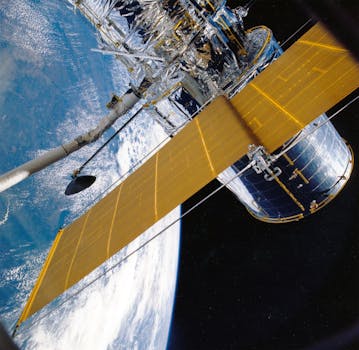The Future of Satellites: Revolutionizing Global Connectivity

The future of satellites is a topic of great interest and importance, as these space-based systems are set to play a crucial role in shaping the future of telecommunications. Future of satellites is an exciting and rapidly evolving field, with new technologies and innovations emerging all the time. At the heart of this revolution is the development of new satellite constellations, designed to provide global coverage and enable a wide range of applications, from broadband internet to IoT connectivity.
One of the key drivers of the satellite industry is the growing demand for global connectivity. As the world becomes increasingly interconnected, the need for fast and reliable communication services is becoming more pressing. Satellites are well-placed to meet this demand, offering a unique combination of coverage, capacity, and flexibility. With the launch of new satellite constellations, such as OneWeb and Amazon’s Kuiper Systems, the possibilities for global connectivity are set to expand dramatically.
Another area where satellites are set to make a significant impact is in the development of 5G networks. As the telecommunications industry shifts towards 5G, satellites will play a crucial role in providing the necessary backhaul capacity to support the increased demand for data. This will enable the widespread adoption of 5G services, including enhanced mobile broadband, ultra-high definition video streaming, and mission-critical communications. The use of satellites in 5G networks will also enable the extension of coverage to remote and underserved areas, helping to bridge the digital divide and promote greater social and economic inclusion.
In addition to their role in telecommunications, satellites are also set to play a key part in the development of other industries, such as navigation, earth observation, and space exploration. With the launch of new satellite systems, such as the European Space Agency’s Galileo navigation constellation, the possibilities for precision navigation and timing are set to expand dramatically. Satellites will also enable the collection of high-resolution imagery and data, supporting applications such as environmental monitoring, crop management, and disaster response.
The future of satellites is not without its challenges, however. One of the main concerns is the growing problem of space debris, which poses a significant threat to the long-term sustainability of space-based systems. As the number of satellites in orbit increases, so too does the risk of collisions and other accidents, which could have disastrous consequences for the entire space industry. To mitigate this risk, satellite operators and manufacturers are working to develop new technologies and strategies for sustainable space operations, such as the use of reusable launch vehicles and the implementation of debris removal systems.
Despite these challenges, the future of satellites looks bright. With the continued advancement of space technology and the launch of new satellite constellations, the possibilities for global connectivity and other applications are set to expand dramatically. As the world becomes increasingly interconnected, satellites will play a vital role in enabling fast and reliable communication services, supporting the growth of industries such as telecommunications, navigation, and earth observation. Whether it’s providing broadband internet to remote communities or enabling the collection of high-resolution imagery and data, the future of satellites is set to be a key driver of innovation and progress in the years to come.
In conclusion, the future of satellites is a complex and multifaceted topic, with a wide range of applications and implications. From the development of new satellite constellations to the launch of 5G networks, the possibilities for global connectivity and other industries are set to expand dramatically. While there are challenges to be addressed, such as the growing problem of space debris, the future of satellites looks bright, with a wide range of opportunities for innovation and progress. As the world becomes increasingly interconnected, satellites will play a vital role in enabling fast and reliable communication services, supporting the growth of industries and promoting greater social and economic inclusion.







